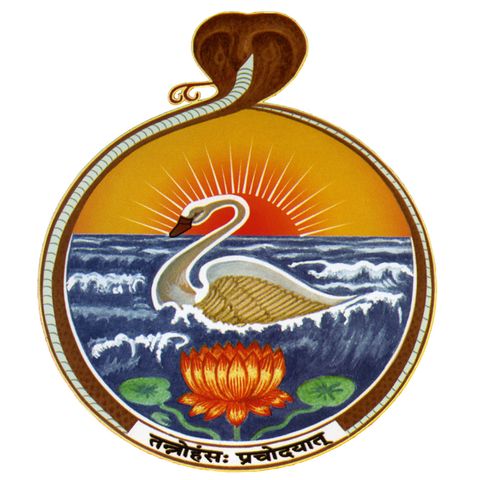Yoga Science: Remaking Your Karma and Starting a New Life | Interfaith Harmony Lecture | Swami Tattwamayananda

Apr 22, 2019 ·
1h 45m 14s
This lecture was given by Swami Tattwamayananda on Thursday, April 11, 2019 at Stanford University. The lecture was hosted by the Stanford Hindu Students Association as part of Interfaith Harmony...
show more
This lecture was given by Swami Tattwamayananda on Thursday, April 11, 2019 at Stanford University. The lecture was hosted by the Stanford Hindu Students Association as part of Interfaith Harmony Week.
-Everybody wants to do noble actions and live up to a spiritual ideal but they also face mental conflicts when they actually try to start a new life. Yoga teaches the origin of those conflicts and how to overcome them.
-Every action or thought (‘karma’) leaves residuals effects (‘vrittis’) in our mental system.
-This accumulation of vrittis forms our character. It leads to strong tendencies (‘samskaras’) and further actions (‘karma’). This is an endless wheel (‘chakram’).
-Deep obsessive attraction (‘raga’), hatred (‘dvesa’) and fear (‘abhinivesa’) keep us chained and conflicted.
-Actions from previous lives have formed much of our character from this life.
-We have the freedom to start a new life by performing new positive actions and changing our karma.
-The result is a deep inner transcendental joy (‘citta prasada’)
The Yoga Tradition teaches a few invaluable techniques for succeeding.
1) Maitri, Karuna, Mudhita, Upeksha – friendliness toward fellow spiritual seekers, compassion for those who are seeking, sincere admiration for the virtuous, and indifference toward the negative.
2) Yamas and Niyamas – close all negative channels
3) Feed the mind with good spiritual food before meditation otherwise, it will eat bad food and revolt.
4) The mind never sits still, so the rascal must be given positive creative outlets.
5) A seeker turns his selfish worries into a great unselfish worry or desire (‘parinama duhkha’). Buddha overcame all his obstacles and became the Buddha.
A comprehensive exposition of this science in 111 lectures can be found at sfvedanta.org.
show less
-Everybody wants to do noble actions and live up to a spiritual ideal but they also face mental conflicts when they actually try to start a new life. Yoga teaches the origin of those conflicts and how to overcome them.
-Every action or thought (‘karma’) leaves residuals effects (‘vrittis’) in our mental system.
-This accumulation of vrittis forms our character. It leads to strong tendencies (‘samskaras’) and further actions (‘karma’). This is an endless wheel (‘chakram’).
-Deep obsessive attraction (‘raga’), hatred (‘dvesa’) and fear (‘abhinivesa’) keep us chained and conflicted.
-Actions from previous lives have formed much of our character from this life.
-We have the freedom to start a new life by performing new positive actions and changing our karma.
-The result is a deep inner transcendental joy (‘citta prasada’)
The Yoga Tradition teaches a few invaluable techniques for succeeding.
1) Maitri, Karuna, Mudhita, Upeksha – friendliness toward fellow spiritual seekers, compassion for those who are seeking, sincere admiration for the virtuous, and indifference toward the negative.
2) Yamas and Niyamas – close all negative channels
3) Feed the mind with good spiritual food before meditation otherwise, it will eat bad food and revolt.
4) The mind never sits still, so the rascal must be given positive creative outlets.
5) A seeker turns his selfish worries into a great unselfish worry or desire (‘parinama duhkha’). Buddha overcame all his obstacles and became the Buddha.
A comprehensive exposition of this science in 111 lectures can be found at sfvedanta.org.
Information
| Author | Vedanta Society, San Francisco |
| Website | - |
| Tags |
Copyright 2024 - Spreaker Inc. an iHeartMedia Company
